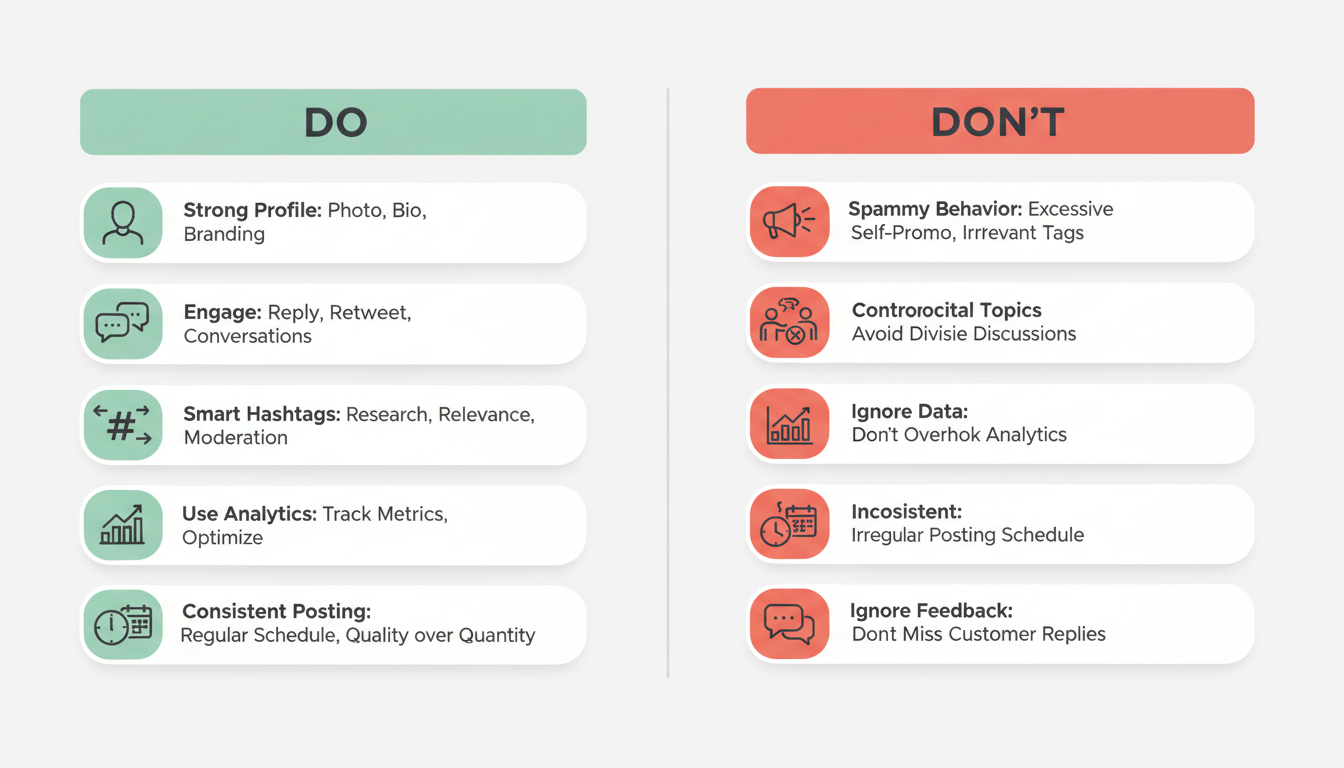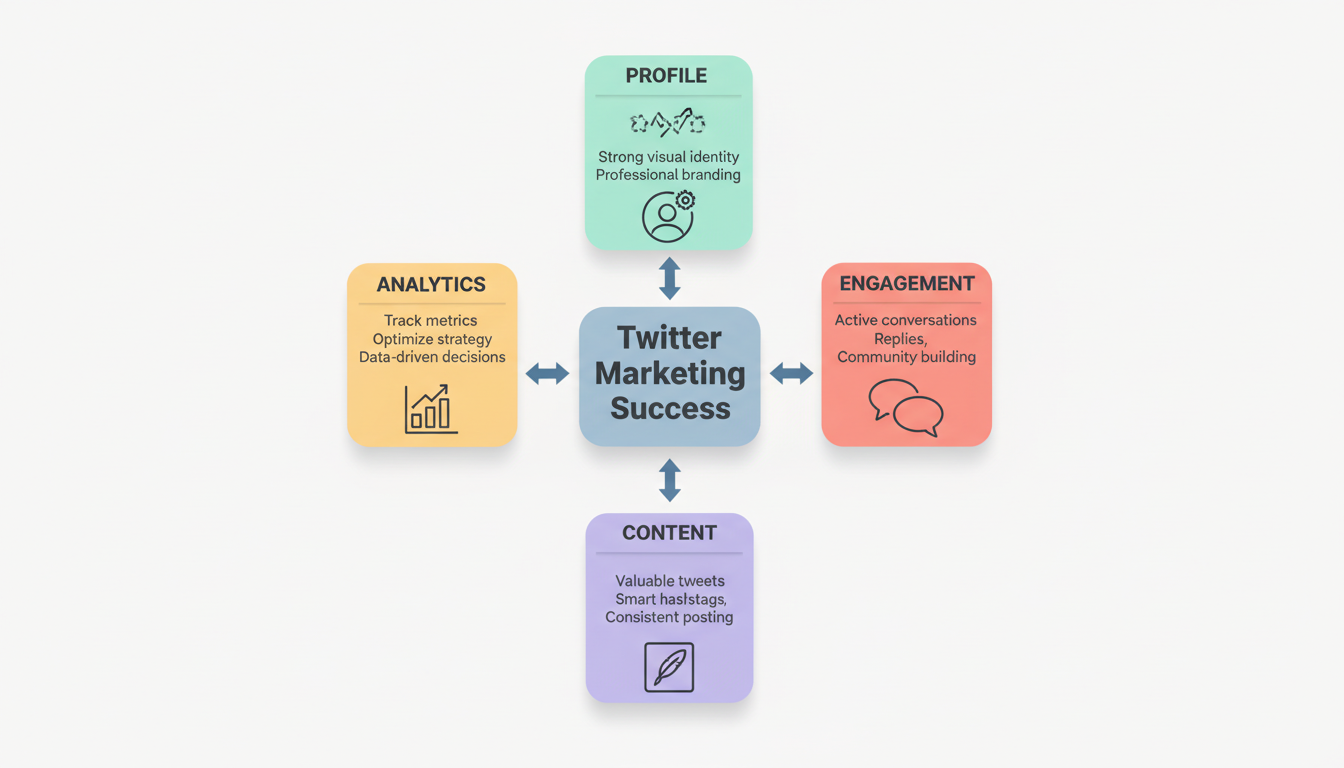Twitter has become a powerful platform for businesses, especially small startups, to connect with their target audience and build brand awareness. However, like any marketing endeavor, there are certain dos and don'ts that businesses should keep in mind to maximize their Twitter marketing efforts. In this article, we will explore the dos and don'ts of Twitter marketing for small startup businesses, as well as provide best practices to ensure success.
Before diving into the dos and don'ts, it is crucial to understand the importance of Twitter for small businesses. Twitter allows businesses to directly engage with their audience, build brand loyalty, and increase website traffic. It is a fast-paced platform where conversation and content spread rapidly. With millions of active users, Twitter provides an immense opportunity for startups to gain exposure and grow their business.
For small startup businesses, Twitter can serve as a powerful tool to level the playing field. It allows startups to compete with established brands by connecting with their audience on a personal level. Twitter provides an open platform where businesses can share their story, showcase their products or services, and interact with potential customers in real-time.
One of the key advantages of Twitter for small businesses is the ability to directly engage with customers. Unlike traditional marketing channels, Twitter allows businesses to have conversations with their audience, respond to inquiries, and address concerns in real-time. This level of interaction not only builds trust and credibility but also helps businesses understand their customers better, enabling them to tailor their products or services to meet their needs.
In addition to direct engagement, Twitter also offers a unique opportunity for small businesses to build brand loyalty. By consistently sharing valuable and relevant content, businesses can establish themselves as thought leaders in their industry. This not only keeps their audience engaged but also encourages them to become advocates for the brand, spreading the word to their own networks.
Before moving on to the dos and don'ts, it is essential to establish the basics of Twitter marketing. First and foremost, every small startup should create a strong and professional profile that reflects their brand identity. This includes using a clear and recognizable logo, a concise bio that highlights the business's unique selling points, and a link to their website or landing page. Additionally, startups should have a clear understanding of their target audience and tailor their content and messaging accordingly.
Another important aspect of Twitter marketing is the use of hashtags. Hashtags are keywords or phrases preceded by the "#" symbol, which categorize tweets and make them discoverable by a wider audience. Small businesses should research and use relevant hashtags to increase the visibility of their tweets and reach a larger audience.
Furthermore, it is crucial for startups to maintain a consistent posting schedule on Twitter. Regularly sharing content keeps the audience engaged and ensures that the business remains visible in their feeds. However, it is important to strike a balance and avoid overwhelming followers with excessive tweets. Quality and relevance should always take precedence over quantity.
Lastly, small businesses should take advantage of Twitter analytics to measure the effectiveness of their marketing efforts. By analyzing metrics such as engagement rates, click-through rates, and follower growth, startups can gain valuable insights into what content resonates with their audience and make data-driven decisions to optimize their Twitter marketing strategy.
Twitter marketing has become an essential strategy for startups looking to establish their brand presence and connect with their target audience. With its fast-paced nature and wide reach, Twitter offers a unique platform for startups to engage with users, build relationships, and promote their products or services. However, to make the most of Twitter marketing, startups need to follow certain best practices. Here are some key dos of Twitter marketing:
Having a strong profile is the first step towards successful Twitter marketing. Startups should ensure that their profile is complete, up-to-date, and visually appealing. This includes choosing a high-quality profile picture, creating an eye-catching header image, and writing an engaging bio that clearly communicates the value proposition of the business.
Moreover, startups should also consider customizing their profile with a branded color scheme or theme to create a cohesive and memorable visual identity. By investing time and effort in building a strong profile, startups can make a positive first impression on potential followers and establish credibility in their industry.
Twitter is all about engagement, and startups should actively participate in conversations with their audience. This goes beyond simply posting tweets and hoping for engagement. Instead, startups should proactively seek out opportunities to connect with their followers and industry peers.
This includes responding to mentions, retweeting relevant content, and initiating conversations with followers. By showing genuine interest in their audience, startups can build stronger relationships and establish themselves as trusted industry experts. This, in turn, can lead to increased brand loyalty, word-of-mouth recommendations, and even potential collaborations or partnerships.
Hashtags are a powerful tool for increasing reach and visibility on Twitter. Startups should research and utilize relevant hashtags in their tweets to attract new followers and join relevant conversations. However, it is crucial to use hashtags strategically and avoid overusing them, as it can come across as spammy and reduce the effectiveness of the message.
When choosing hashtags, startups should consider their target audience's interests and behaviors. By using popular and trending hashtags, startups can tap into existing conversations and increase the chances of their tweets being discovered by a wider audience. Additionally, creating unique branded hashtags can help startups establish their own online community and encourage user-generated content.
Furthermore, startups can also leverage Twitter chats and participate in industry-specific hashtag discussions to connect with like-minded individuals and expand their network. By actively engaging in hashtag conversations, startups can position themselves as thought leaders and gain valuable exposure within their industry.
In conclusion, Twitter marketing offers startups a valuable opportunity to connect with their audience, build brand awareness, and drive business growth. By following the dos of Twitter marketing, startups can maximize their impact on the platform and establish a strong online presence that resonates with their target audience.
Twitter marketing can be a powerful tool for startups to reach their target audience and build brand awareness. However, there are certain pitfalls that startups should avoid to ensure their Twitter marketing efforts are successful. In this article, we will explore some of the key "don'ts" of Twitter marketing and provide valuable insights on how to navigate these challenges.
One of the biggest mistakes startups can make on Twitter is behaving in a spammy manner. This includes sending excessive self-promotional tweets, constantly tagging irrelevant accounts, and flooding timelines with irrelevant content. While it may be tempting to constantly push your products or services, this approach can quickly turn off your audience and lead to unfollows.
Instead, startups should aim to provide value to their audience and focus on building relationships. This can be achieved by sharing informative and engaging content, participating in relevant conversations, and offering helpful insights. By establishing yourself as a valuable resource in your industry, you can attract a loyal following and increase your chances of converting followers into customers.
Twitter is a platform where topics and opinions can quickly become divisive. Startups should be cautious when discussing controversial topics, as it can alienate potential customers and damage their brand reputation. While it's important to have a voice and stand for what you believe in, it's equally important to consider the potential implications before commenting on sensitive subjects.
Prior to engaging in discussions on controversial topics, startups should conduct thorough research to ensure they have a well-informed perspective. It's also essential to consider the potential impact on your target audience and whether it aligns with your brand values. By approaching these discussions with sensitivity and thoughtfulness, startups can avoid unnecessary backlash and maintain a positive brand image.
Analytics plays a vital role in understanding the effectiveness of Twitter marketing efforts. Startups should regularly analyze their Twitter analytics to identify top-performing tweets, engagement patterns, and overall audience demographics. By leveraging these insights, startups can optimize their content strategy and improve their performance on the platform.
Twitter analytics can provide valuable information about the type of content that resonates with your audience, the best times to post, and the demographics of your followers. Armed with this knowledge, startups can tailor their content to better meet the needs and preferences of their target audience. Additionally, analyzing engagement patterns can help identify opportunities for increased interaction and community building.
In conclusion, Twitter marketing can be a powerful tool for startups, but it's important to avoid certain pitfalls. By avoiding spammy behavior, steering clear of controversial topics, and leveraging analytics, startups can maximize their Twitter marketing efforts and achieve their goals. Remember, building a strong presence on Twitter takes time and effort, so be patient and consistent in your approach.

Timing is crucial on Twitter, as tweets have a limited lifespan due to the fast-paced nature of the platform. Startups should utilize scheduling tools to ensure that their tweets are posted at optimal times when their target audience is most active. This helps to increase reach, engagement, and the likelihood of their content being seen by the right people.
Twitter offers a range of advertising options for businesses looking to accelerate their growth. Startups should consider investing in promoted tweets, trends, or accounts to increase their visibility and reach a wider audience. However, it is important to carefully plan and target these ads to ensure maximum return on investment.

Consistency is key in Twitter marketing. Startups should maintain a regular posting schedule to keep their audience engaged and their brand top of mind. Inconsistency can lead to a decline in followers and diminished visibility. By establishing a content calendar and adhering to it, startups can build momentum and ensure consistent growth.
Twitter provides businesses with a direct line of communication with their customers. Startups should be proactive in seeking feedback, addressing customer concerns, and responding to queries. Ignoring customer feedback can be detrimental to the brand's reputation and customer loyalty. By actively listening and acting upon customer feedback, startups can foster positive relationships and improve their products or services.
In conclusion, Twitter marketing can be a game-changer for small startup businesses. By following the dos and don'ts outlined in this article, startups can effectively leverage Twitter to connect with their audience, build brand awareness, and drive business growth. It is crucial to understand the fundamentals, engage authentically with the audience, and continuously analyze and optimize marketing efforts on the platform. With dedication and strategic execution, Twitter can become a powerful tool for small startups to thrive in the digital landscape.
By submitting this form, you agree to our Privacy Policy and Terms & Conditions.